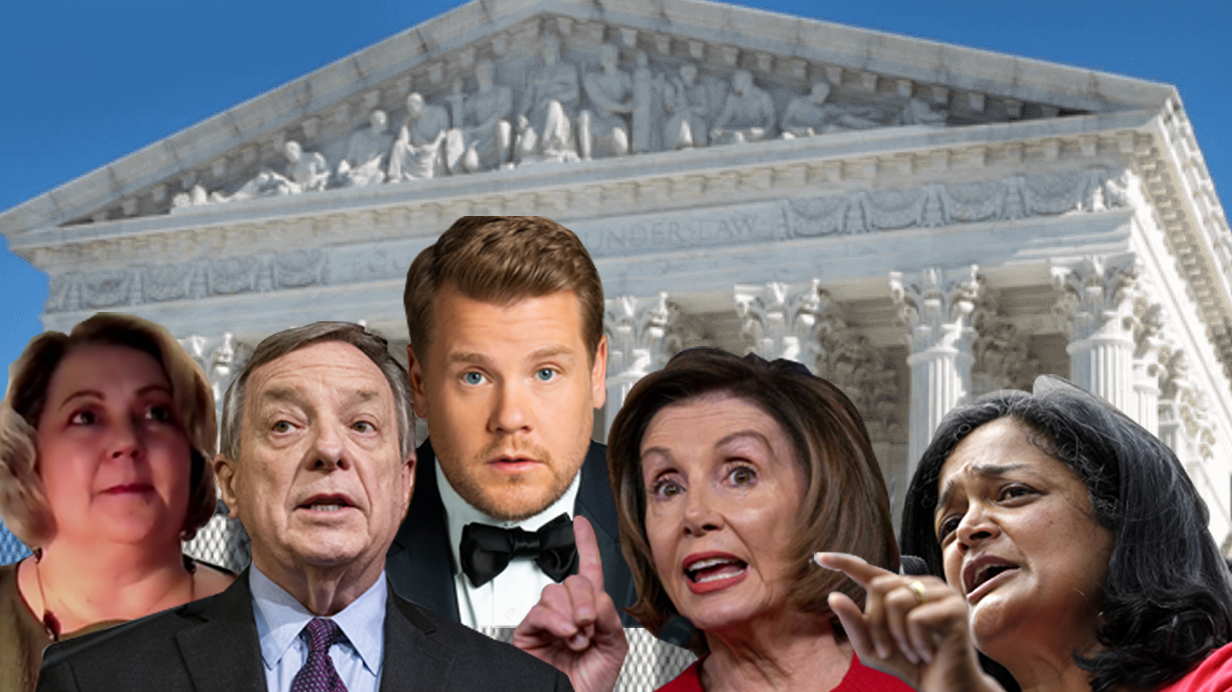
Dan O’Donnell fact-checks the worst lies about the Court’s leaked decision in Dobbs v. Jackson Women’s Health
May 6, 2022
Perspective by Dan O’Donnell
With much of the media still hyperventilating over the likelihood that Roe v. Wade will be overturned once the Supreme Court publishes its leaked decision in Dobbs v. Jackson Women’s Health, it has been difficult to determine the true impact of the decision.
Does the Court have the right to overturn “settled law?” Of course it does. Will abortion be outlawed across the country? Of course it won’t. Will women be forced into deadly back-alley abortions? No, and in fact illegal abortions before Roe was decided were not nearly as deadly as has been claimed.
These are the worst lies told about the Dobbs decision:

“[The justices] do not have the right to change [Roe], which has been settled law for two generations now of people who have grown up, who have gone through their 20s in the firm belief they can make these decisions about their own bodies.” –Rep. Pramila Jayapal (D-WA), May 3
This is just staggeringly ignorant. Obviously the Supreme Court has the right to reverse its prior decisions. If it didn’t, schools would not be integrated. In 1896, the Court determined in Plessy v. Ferguson that segregation laws did not violate the 14thAmendment’s guarantee of equal protection under the law.
As a result, the concept of “Separate but Equal” was the law of the land for nearly a half-century. In 1954, however, the Court recognized its grievous error (primarily because separate was never actually equal) and ruled in Brown v. Board of Education that state laws establishing and maintaining segregation were unconstitutional even if they purported to (or even did) provide “equal” facilities.
Would Congresswoman Jayapal dare suggest that the Brown court did not have the right to overturn Plessy? While courts are generally deferential to prior precedent and adhere to the principle of stare decisis (Latin for “let the decision stand”), Justice Alito noted in his opinion in Dobbs that this ““does not compel unending adherence to Roe’s abuse of judicial authority.”

“[The Dobbs decision] did violence, not only to women, but to the Constitution of the United States.” –House Speaker Nancy Pelosi, May 4
Democrats just love calling speech “violence,” don’t they? Anything that offends is somehow a violent act against anyone whose feelings were hurt. Pelosi takes this canard to new heights—or, more accurately, depths—by claiming that the Dobbs decision is an affront to the Constitution.
In reality, it is a long-needed correction of a Roe decision that actually did damage to the constitutional precept of the separation of powers. Roe didn’t just invalidate 50 different state abortion laws, it usurped the constitutionally proscribed power of both Congress and state legislatures to write laws. Legislative bodies, as the representatives of the people, are the voice of the people themselves. By creating a legal framework for the administration of abortion in the United States, the Roe court unlawfully seized for itself the authority that the Constitution designates to the people.
“Roe was on a collision course with the Constitution from the day it was decided, and Casey [v. Planned Parenthood, which upheld Roe] perpetuated its errors,” Alito writes. “And the errors do not concern some arcane corner of the law or little importance to the American people.
“Rather, wielding nothing but ‘raw judicial power,’ the Court usurped the power to address a question of profound moral and social importance that the Constitution unequivocally leaves for the people.”
If anything perpetuated “violence” against the Constitution, it was Roe. Dobbs reclaimed the authority to settle profound moral and social questions for the people, who should always be the ones to answer such questions.

“Make no mistake, this is the biggest rollback of human rights in modern U.S. history.” –Late night talk show host James Corden, May 4
What right, specifically, is being rolled back? As Alito observed in his opinion, “the Constitution makes no reference to abortion, and no such right is implicitly protected by any constitutional provision.” Even the Roe court was unable to determine how exactly a right to an abortion is protected under the Constitution.
“Roe…was remarkably loose in its treatment of the constitutional text,” Alito wrote. “It held that the abortion right, which is not mentioned in the Constitution, is part of a right to privacy, which is also not mentioned. And that privacy right, Roe observed, had been found to spring from no fewer than five different constitutional provisions—the First, Fourth, Fifth, Ninth, and Fourteenth Amendments.”
That seems like an awful lot of amendments to justify the creation of one right, doesn’t it? It seems as though either the Framers of the Constitution, who crafted the Bill of Rights, or the authors of the Fourteenth Amendment several generations later would have explicitly protected a “right to privacy” that included the right to terminate a pregnancy had they believed that to be a right worth protecting.
The harsh reality for even Roe’s most ardent defenders to grapple with is that the Court simply invented a right to get to a politically and socially preferred outcome. Abortion, especially of a viable or “quick” fetus, was always considered to be a crime from the earliest days of the English common law to the Revolution, the post-Civil War era in which the 14th Amendment was first litigated, and straight through to just a few years before Roe was decided.
“Until the latter part of the 20th century, there was no support in American law for a constitutional right to obtain an abortion. Zero. None,” Alito wrote. “No state constitutional provision had recognized such a right. Until a few years before Roe was handed down, no federal or state court had recognized such a right.
“Nor had any scholarly treatise of which we are aware. And although law review articles are not reticent about advocating new rights, the earliest article proposing a constitutional right to abortion that has come to our attention was published only a few years before Roe.”

“I’m in disbelief and I can’t believe that this is going to happen, and I can’t believe that it can take us back 50 years and there’s going to be so many unnecessary deaths, and people without what they need for healthcare, and to take care of themselves.” –Melissa Mills, daughter of “Jane Roe,” May 3
Much has been made about the return to deadly “back-alley abortions” and the devastating impact that Dobbs will have on “women’s health,” but none of it is grounded in reality.
Data regarding illegal abortions in the pre-Roe era is difficult to come by, with estimates ranging from a few hundred thousand to 1.2 million per year, but in 1976 the Centers for Disease Control attempted to determine the impact the Court’s decision had on cutting back the practice. Its findings were remarkable: Approximately 130,000 illegal abortions were performed in the United States in the year before Roe was decided, and 39 women died in illegal abortions.
This means that just 0.003% of women who had illegal abortions died during or after the procedure. And the 39 total deaths from abortion in 1972 is in line with the number of people who die from lightning strikes each year (estimated at about 20). Illegal abortions were, statistically speaking, far safer than mowing the lawn, as an estimated 951 people die each year from “contact with a power lawnmower.” Heck, even using the restroom was far more dangerous, with about 2,167 people per year dying of “constipation.”
This is not to minimize the victims of illegal abortion in the pre-Roe era, but rather to illustrate that fears over the “unnecessary deaths” the Dobbs decision will cause are greatly overstated. 50 years of medical advances means that the risk of women dying in illegal abortions today is nearly zero.

“The election in this November is going to be a referendum on privacy and your rights to freedom as an American. They don’t want to make that the case. They want it to be, ‘oh, it’s inflation, it’s something at the border.’ No, it’s something more basic than that. It’s in your bedroom.” Sen. Dick Durbin (D-IL), May 3
Obviously no one can predict the future and claim with any certainty how one event six months before Election Day will impact the vote, but the idea that Americans will cast their ballots based on Dobbs and not the crashing economy doesn’t line up with historical reality.
Voters always prioritize their personal financial situation over nearly everything else, and last November’s gubernatorial election in Virginia provides a useful parallel. Democratic candidate (and former governor) Terry McAuliffe spent roughly $4 million on TV ads attacking his Republican opponent Glenn Youngkin over the abortion issue and casting him as a pro-life extremist. Exit polling showed that of the eight percent of voters for whom abortion was the most important issue, 58 percent supported Youngkin, who won election in a blue state relatively easily.
Nationwide, support for limitless abortion is something of a fringe position. A January Marist poll found that just 17 percent of Americans support elective abortion at any point during pregnancy. 49 percent say it should never be allowed or allowed only in very rare circumstances.
The nation is far more pro-life than abortion supporters would like to admit, and while the Dobbs decision has been met with wailing and gnashing of teeth in media circles, many Americans quietly support it.